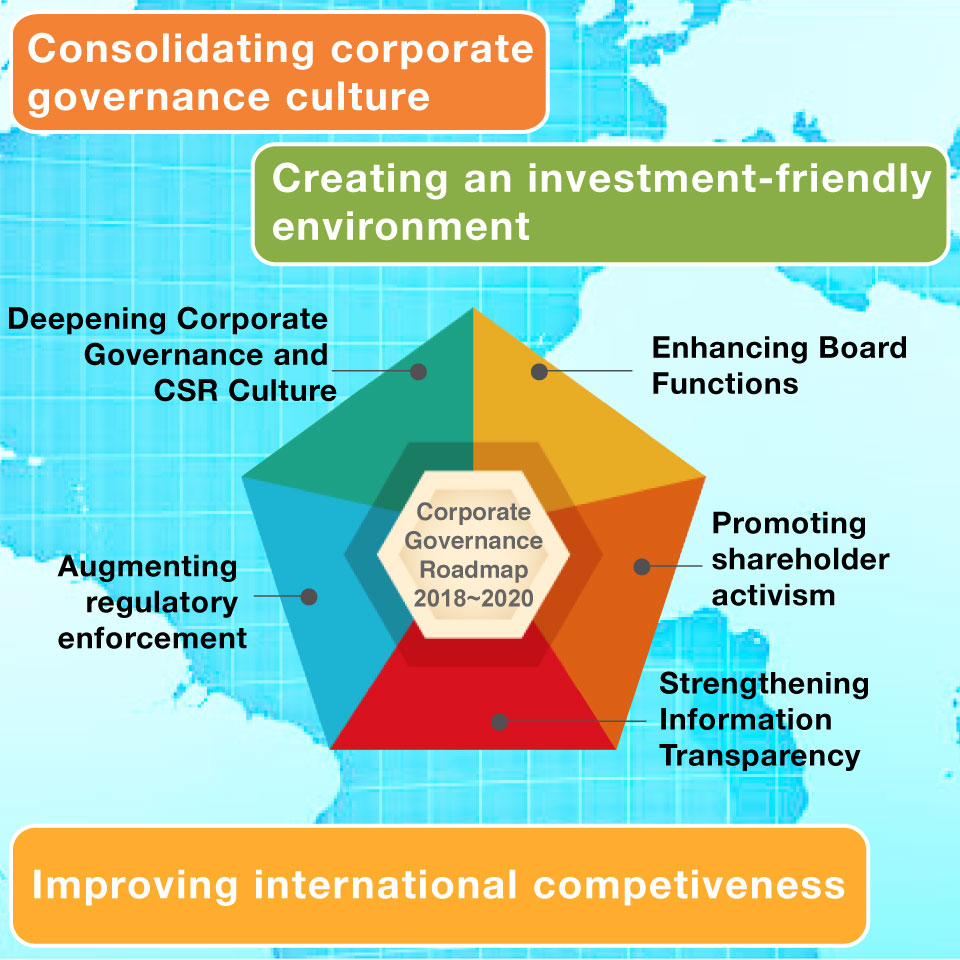Press ReleasesLatest News
Corporate Integrity Risk Management and CSR Seminar Establishes an Honest and Responsible Corporate Culture
The Taiwan Stock Exchange (TWSE) and Taipei Exchange (TPEx) held the first “Seminar with Directors and Supervisors of TWSE or TPEx Listed Companies - New Perspectives on Corporate Integrity Risk and Corporate Social Responsibility” at Chang Yung-Fa Foundation on August 27. Those invited to give keynote speeches were; Yang, Shih-Chin, deputy director of Agency Against Corruption, Ministry of Justice; Wu Chih-Wei, Senior Executive Officer of Bureau of Energy of the Ministry of Economic Affairs; and Tony Mo, deputy secretary general of Business Council for Sustainable Development of Taiwan. Over 300 directors and supervisors of TWSE and TPEx listed companies attended the meeting, leaving no seats unfilled.
In his speech, Chien Lih-Chung, senior executive vice president of TWSE, stated that directors and supervisors are crucial to corporate governance. Good boardroom operations generate a positive effect on corporate governance. The Corporate Governance Center has been actively promoting corporate governance measures, including “Corporate Governance Evaluation” and the “TWSE Corporate Governance 100 Index” to spur friendly competition among companies, and serve as an indicator that institutional investors can refer to when selecting stocks. In addition to continuing to promote the “Corporate Governance Roadmap”, TWSE plans to establish a Stewardship Code for institutional investors, which will enable institutional investors to continue their appetite for reforms in the capital market. This is an important direction for enhancing corporate governance and the capital market.
Deputy Director-General Yang Shih-Chin pointed out that integrity is the foundation of business management. Setting up good working conditions for employees and establishing goodwill can be highly beneficial for companies. Business leaders need to exhibit high levels of ethical conduct and social responsibility, and meet public expectations. For example, in Finland and New Zealand, the culture of honesty and integrity is extremely natural. In the Corruption Perceptions Index (CPI), Taiwan was ranked 35 out of 175 (higher rank means lower perceived levels of corruption). Taiwan strives to keep improving its ranking. Deputy Director-General Yang also shared the development trends for U.S. Foreign Corrupt Practices Act and U.K. Bribery Act 2010, as well as elucidating the scope of Taiwan’s Anti-Corruption Act. Leaked corporate secrets, tunneling frauds, and food safety incidents caused a major impact on the national economy, more severe than that of traditional corruption. Companies should integrate integrity into their corporate code of conduct, and establish and maintain effective internal controls to prevent corruption.
Deputy Secretary General Tony Mo pointed out that economic globalization brought poverty, environmental pollution, population pressure, and other such derivative issues. Corporate layoffs, plasticizer, and food safety incidents caused the world to distrust corporations. Green purchasing, supply chain management, socially responsible investment, and other such non-financial disclosure policies were born in light of these crises. Taiwan’s Greenhouse Gas Reduction Act came into effect on July 1 this year, with a target to reduce carbon emission by at least 50% by 2050 (with 2005 as the benchmark). Following the worldwide trend of attaching more importance to corporate social responsibility (CSR), there needs to be a change to business management. Deputy Secretary General Mo gave examples of renowned foreign corporations such as Unilever and General Electric that have integrated CSR into their corporate strategies, and encouraged domestic companies to internalize CSR into their operations management. A robust report will enable companies to achieve corporate sustainability faster.
Next, Senior Executive Officer Wu Chih-Wei introduced the green power pricing system, stating that green power purchasing will prompt companies and the public to participate in reducing carbon emission, thereby supporting the development of renewable energy policies. As of August 24 of this year, the amount of Taiwan’s green power purchased was 35 times that of last year, demonstrating that Taiwan is paying increasing attention to the problem of global warming. The forum came to a successful close with the enthusiastic participation of representatives from TWSE and TPEx listed companies.


